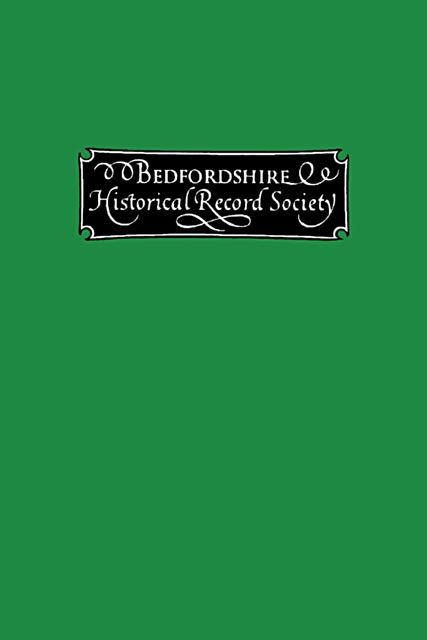Book contents
- Frontmatter
- Contents
- Abbreviations and Symbols
- The Shefford Beaker: circa 1800 B.C.
- The Morteyn Family in Bedfordshire
- The Shire of Bedford and The Earldom of Huntingdon
- The Later Descent of Wingate of Harlington
- The Disseisins by Falk de Breauté at Luton
- An Elizabethan Inquisition Concerning Bondmen
- Roll of The Justices in Eyre, 1240
- A List of Bedfordshire Apprentices: 1711 - 1720
- The Commune of Bedford
- Addendum I. “The Shire of Bedford and The Earldom of Huntingdon.”
- Addendum II. “The Disseisins of Falk de Breauté.”
- A Hand List of The Bedfordshire County Muniments : Prepared by The County Records Committee
- Index
Roll of The Justices in Eyre, 1240
Published online by Cambridge University Press: 14 July 2023
- Frontmatter
- Contents
- Abbreviations and Symbols
- The Shefford Beaker: circa 1800 B.C.
- The Morteyn Family in Bedfordshire
- The Shire of Bedford and The Earldom of Huntingdon
- The Later Descent of Wingate of Harlington
- The Disseisins by Falk de Breauté at Luton
- An Elizabethan Inquisition Concerning Bondmen
- Roll of The Justices in Eyre, 1240
- A List of Bedfordshire Apprentices: 1711 - 1720
- The Commune of Bedford
- Addendum I. “The Shire of Bedford and The Earldom of Huntingdon.”
- Addendum II. “The Disseisins of Falk de Breauté.”
- A Hand List of The Bedfordshire County Muniments : Prepared by The County Records Committee
- Index
Summary
Since the Eyre of 1227 already published, the Justices had visited Bedford in 1232, Dunstable in 1233, Bedford and Dunstable in 1236, but the Rolls of their proceedings have disappeared. From the present Roll of 1240, both the pleas at Dunstable and the Pleas of the Crown are unfortunately missing, and consideration of the final concords seems to indicate that even the Common Pleas are incomplete.
The Roll was transcribed from rotagraphs, and has been translated in full below, except for some omissions of ‘common form’ which are marked by ‘[etc.]’; numerous similar omissions by the original scribe seem to justify this procedure. The fully extended form of the various assises may be studied, both in Latin and English, in an earlier volume of our publications. All names of persons and places have been checked by the original manuscript.
To this translation have been added obvious Bedfordshire cases from the Rolls of the same Justices on Eyre in other Counties; these are given here chiefly in abstract, translation being marked by inverted commas; Essoins and Attornments have generally been omitted.
Even this list does not exhaust their activity; they were certainly at Hertford on 24 June, and at Cambridge on 6 October, 1240; they were probably at Northampton before Bedford (case 206), and were due at Lewes on 15 July 1241 (case 235), but no rolls of this year for Northants, and Sussex have been preserved. They probably visited yet another county between Newport Pagnell and Oxford. No record of their Commission has been traced, but their names can be drawn from final concords levied before them. The Justices at Bedford were—Rannulf the Abbot of Ramsey, William de Eboraco, Gilbt. de Preston, Rog. de Thurkelby, and Hen. de Bathonia. Their leader, Will, de Ebor’, was Provost of the secular College of Beverley, and in 1245 was consecrated Bishop of Salisbury; he died in 1256.
This Eyre is noted by Matthew Paris under the year 1240; he comments that “under the pretence of justice, they collected a huge sum (infinitam pecuniam) for the use of a King who squandered everything.” This criticism is not quite borne out by the Rolls; the cases are of the ordinary and routine character, dealt with in the ordinary way.
- Type
- Chapter
- Information
- Publisher: Boydell & BrewerFirst published in: 2023



